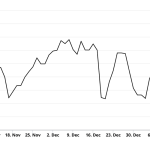The trillion-dollar club is an exceedingly rare group. In fact, there are only 5 companies on that list currently. Investors can buy shares in 4 of the 5 on U.S. exchanges. The fifth, Saudi Aramco, trades on the Tadawul, Saudi Arabia’s stock exchange. Regardless of where they can be purchased, companies valued at $1 trillion make up a tiny fraction of all firms on the planet, and investors are always looking for the next trillion-dollar companies.
It’s a safe bet that the next trillion-dollar firm already ranks fairly highly by market capitalization. Companies of this magnitude don’t emerge overnight. The firms below have strong chances of joining the short list of trillion-dollar club stocks, perhaps as the next entrant.
Nvidia (NVDA)
Nvidia (NASDAQ:NVDA) is highly likely to be the next high-growth stock for the trillion-dollar club. It is currently ranked 6th by market cap at $963 billion, roughly $300 billion behind entry number 5, Amazon (NASDAQ:AMZN), valued at $1.2 trillion.
That said, Nvidia still has a long way to go to reach the trillion dollar threshold. Yet, it is the most likely to join the club. Not only because of all the firms below that milestone it is the closest, but also because of artificial intelligence (AI). The emergence of AI has again catalyzed Nvidia into another period of rapid growth.
In 2023 alone Nvidia’s value has increased more than 160%. This could be the fifth year since 2016 that the company has seen its value increase by 100% or more if current trends continue for the year.
The company seems to move by trends more than fundamentals. If 2023’s AI boom continues and markets continue to favor the tech then NVDA shares could reach that threshold quickly.
UnitedHealth Group (UNH)
UnitedHealth Group (NYSE:UNH) stock is a safe bet to cross the $1 trillion threshold at some point. That said, UNH is valued at $448 billion right now. Meaning it’s likely going to take a while before it could reasonably be expected to more than double in value.
Apple (NASDAQ:AAPL) was worth $500 billion in 2012. Apple broke the $1 trillion mark in August 2018. That probably means UNH stock will take longer given that the healthcare sector doesn’t grow nearly as quickly as valuations do in the tech sector. But it at least gives investors some idea of what to expect in regard to the growth trajectory.
What’s more important here is that UnitedHealth will grow steadily to one day reach $1 trillion. Shareholders should expect roughly $25 in earnings for each UNH share they own in 2023. Add to that, its dividend, and UnitedHealth is one of the steadiest companies that will one day reach that valuation.
Eli Lilly (LLY)
Eli Lilly (NYSE:LLY) is the 15th most valuable firm globally, worth $405 billion. Like UnitedHealth Group, it’s a long way from $1 trillion.
However, Eli Lilly has a potent catalyst on its side in the form of Mounjaro, its diabetes drug that is showing massive promise as a weight loss therapy. It could receive an FDA recommendation as a weight loss drug by the end of this year. If it does, expect share prices to rise. Over time the appetite suppressant has the possibility to become among the best-selling drugs ever.
Analysts believe Mounjaro could reach peak sales of $25 billion. That would be far above the $20.7 billion Humira recorded in 2022, a record aside from Covid-19 vaccines. Eli Lilly’s Alzheimer’s drug, Donanemab, continues to show promising results and is considered to be among the best candidates for treating that disease. A win there would only hasten LLY’s march to $1 trillion. That said, analysts believe that even without an Alzheimer’s breakthrough Eli Lilly will only continue to increase in value. $1 trillion is far away now but breakthrough pharma sales will act as a powerful valuation catalyst.
On the date of publication, Alex Sirois did not have (either directly or indirectly) any positions in the securities mentioned in this article. The opinions expressed in this article are those of the writer, subject to the InvestorPlace.com Publishing Guidelines.





